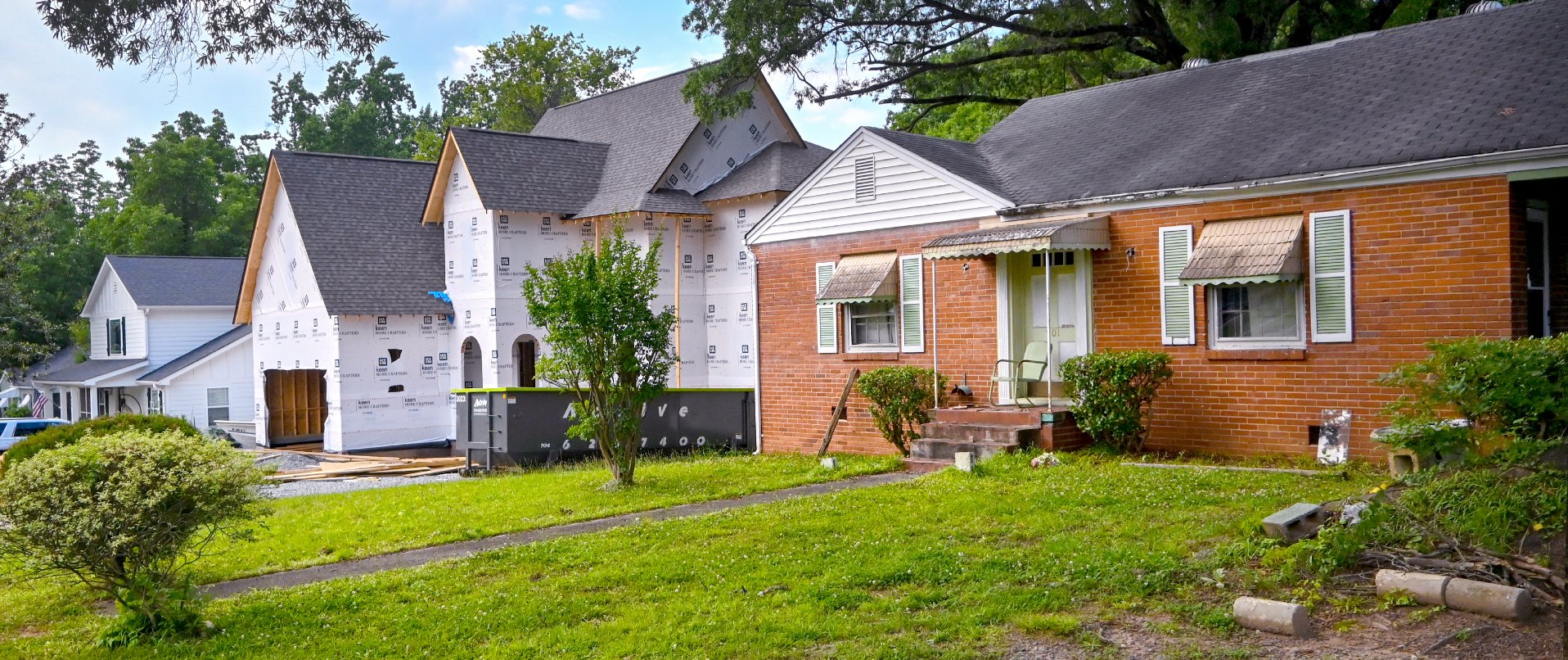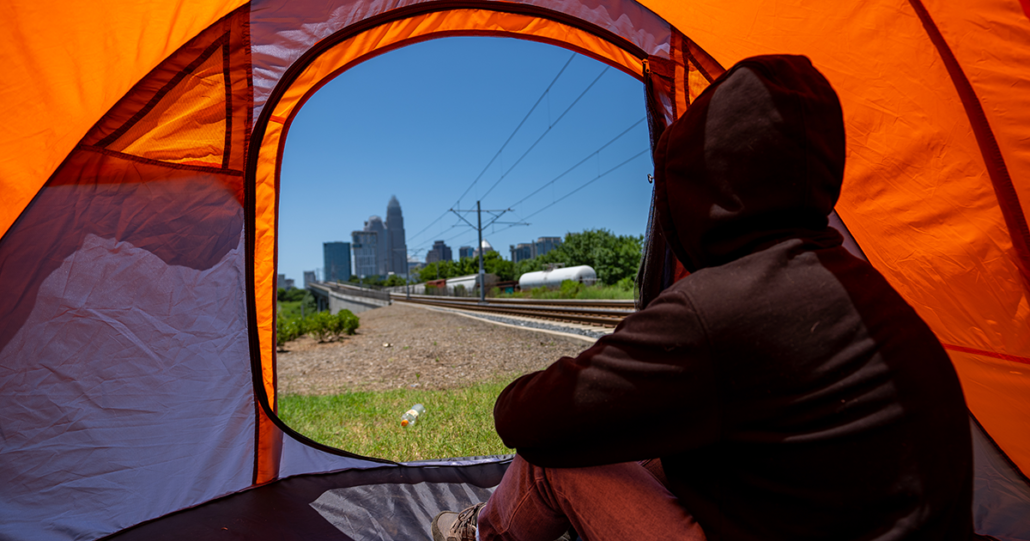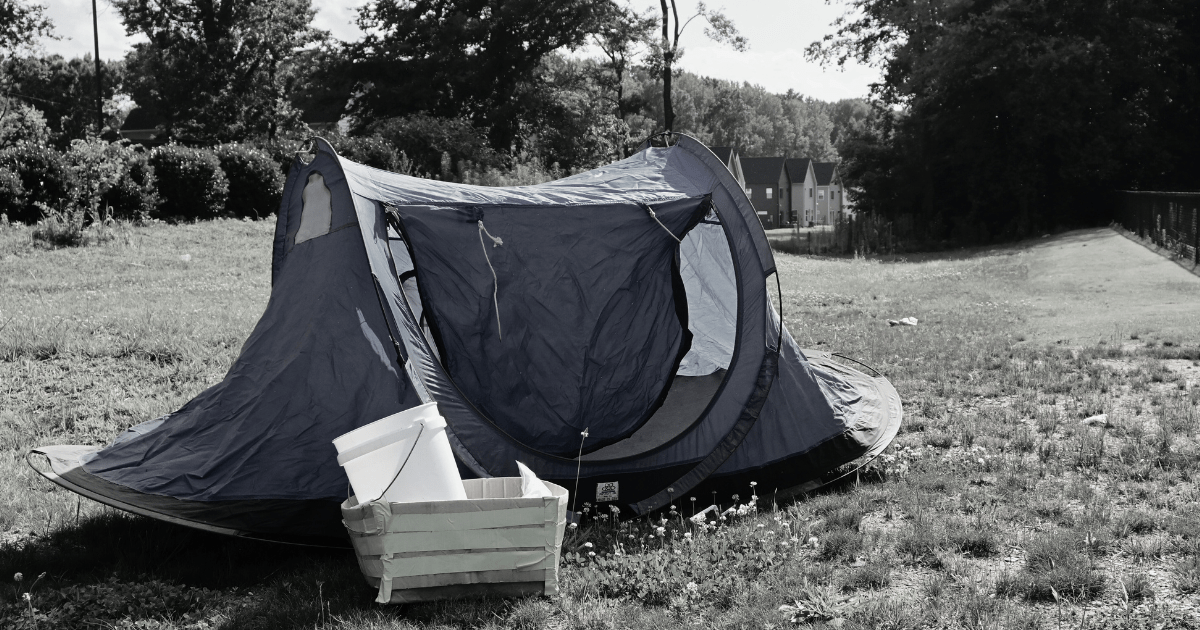
A Home For All: Prevention Pillar
Justin D. Tucker & Kate Taylor Harcourt-Medina
This blog post is from the Charlotte-Mecklenburg Housing & Homelessness Dashboard. View the original post here.
Recently, United Way of Greater Charlotte (United Way) released the A Home For All Implementation Plan. Building on the priorities identified in the Strategic Framework, the Implementation Plan outlines which priorities to advance first in order to address housing instability and homelessness across the Charlotte-Mecklenburg area. This is the second post in a series of blogs examining the three pillars of the A Home For All Implementation Plan: People, Prevention, and Production. For more information on the People Pillar, click here.
This blog provides an overview of the Prevention Pillar.

The Prevention pillar focuses on the methods used to reduce displacement and acute issues that lead to homelessness and includes four of the nine initial priority initiatives that will move forward. Charlotte-Mecklenburg needs a meaningful housing preservation strategies that will reduce housing instability for the region’s most vulnerable residents. This pillar responds to the current mechanisms available to address and innovates new strategies for moving forward. This pillar includes the following initiatives:
- Critical Home Repair
- Legal Advocacy
- Upstream Emergency Rental Assistance
- Strike Fund
Many homeowners and property providers face issues keeping up with the maintenance costs of homeownership, particularly homeowners and property providers with fixed or limited incomes. Maintenance issues can lead to health and safety issues that may eventually result in homeowners or renters losing their homes, or renters residing in homes that are unsafe, or contribute to poor health outcomes. In response, many communities across the country provide small, one-time grants that allow homeowners and property providers to make critical home repairs, made possible by public and private funding. The City of Charlotte, Mecklenburg County, and multiple nonprofit providers have successful critical home repair programs. Nevertheless, it is difficult for the City and County to fully deploy the existing funds within the current system, and the existing programs are unable to meet the demand for repairs. Under the critical home repair initiative, the focus is understanding the systemic issues that impede efforts to meet the full demand of repairs.
Under legal advocacy, the City and the County have both given money to Legal Aid of North Carolina to scale up their work. Legal Aid of North Carolina is a statewide, nonprofit law firm that provides free legal services in civil matters to low-income people in order to ensure equal access to justice and to remove legal barriers to economic opportunity. Their Housing Unit, in Charlotte, is the only organization in court fighting daily for housing stability and habitability in Mecklenburg County, representing hundreds of households in court each year. They represent tenants facing eviction, potential homelessness, unlawful debt collection, and unsafe housing conditions. This work is especially critical because according to one report, “nationwide, only 3 percent of renters are represented, compared to 81 percent of landlords on average.” Those nationwide numbers track in Mecklenburg County. One study focused on Mecklenburg eviction cases filed in July 2016. Without legal representation, most renters facing eviction will lose in court and face potential homelessness. The demand for legal advocacy has continually increased and these funds will allow Legal Aid of North Carolina to expand their capacity. As this initiative is strictly focused on expanding funding, there is no implementation team for this initiative.
During the pandemic, Mecklenburg County successfully dispersed $123 million in emergency rental assistance and utility assistance to over 23,000 families through the Rent and Mortgage Assistance Program (RAMP). Charlotte-Mecklenburg saw innovations in the operations of emergency rental assistance providers, outreach communication, and database management. These innovations and others could propel the opportunity to provide more upstream support to households and reduce long-term housing insecurity and homelessness, and the lessons learned from that program can be used to pilot an adjusted program design that will combine administrative innovations, working with community organizations, increasing documentation flexibility and streamlining tenant engagement.
Finally, to address the demand for NOAH preservation, a countywide acquisition strike fund is necessary. The funding would braid public and private dollars and provide financing to acquire properties and operate them as affordable housing until permanent financing for long-term operations is secured, often up to three years. This initiative is not moving forward this fiscal year.
WHERE WE ARE NOW/ NEXT STEPS
For each of the initiatives moving forward this fiscal year, with the exception of Legal Aid, an implementation team, consisting of those with lived experience as well as leaders invested in this work, has been created to guide the work forward. A Request for Proposals was released for a consultant to provide technical assistance in piloting critical home repair and emergency upstream rental assistance. The Implementation team for these pillars are currently reviewing proposals and making selections. Once awarded, the consultant will work with the implementation team to elicit feedback on all aspects of objectives and outcomes of piloting and evaluating the work.
COMMUNITY NEED
With the continued rising cost of rent in Charlotte and stagnating wages, the housing affordability crisis in Mecklenburg County is reaching levels never seen in the history of this State. With almost all the COVID funding gone, except for a few small pockets, rental assistance is all but gone too. There are a few local organizations that are still able to assist renters with catching up on their past due balance when they fall behind on their rent but none of them can cover the types of past due balances we were seeing during the COVID pandemic and are seeing now.
Moreover, there is no organization that can assist a renter with forward rent to cover a few months’ rent in advance. These types of rental assistance proved to be crucial during the COVID pandemic in housing stability because it offered the renter more time – time to save money that was used on a car repair or on an unexpected emergency room visit, time to get their first paycheck because they just started a new job after being laid-off, and time to find a new home because their home had repair issues the landlord refused to fix.
Additionally, there is no organization assisting renters with getting repairs fixed in their home by assisting the landlord with the financial burden of making those repairs. If owners had assistance with covering the cost of repairs, it is very likely they would be more inclined to make the repairs on their own versus being coerced into making the repairs. For homeowners, allowing for expansion and improved strategies to disseminate critical home repair can help ensure they are able to remain housed and also allows our elderly population to age in place.
Renters with attorneys generally have drastically different results than those without representation. Legal Aid attorneys both argue cases in trial and negotiate for tenants (or a combination of those services) depending on the client’s situation. Legal Aid’s clients usually obtain favorable outcomes – case dismissals, lease renewals, manageable move out timelines, balances lowered or waived, or even payments to tenants. Out of the 786 households who received direct representation from July 2022 to July 2023, Legal Aid helped stop or delay evictions for 98 percent of them. More than 27 percent of tenants received repairs or compensation for the landlord’s failure to make repairs during the same time span, July 2022 to July 2023.
SO WHY DOES THIS MATTER?
Together, these initiatives work to reduce displacement and create a community where homelessness is rare, brief, and nonrecurring and every person has access to permanent, affordable housing and the resources to sustain it.
Visit AHomeForAllMeck.org to view the Implementation Plan, learn more about the initiative and sign up to receive email updates or follow along on Facebook, Twitter or Instagram.
Justin Tucker is one of the Supervising Attorney’s in Legal Aid of North Carolina’s Charlotte Office, Housing Unit. Prior to serving as Supervising Attorney, Justin worked as a Staff Attorney in the housing Unit. Justin has been with Legal Aid since 2020. Prior to working at Legal Aid, Justin volunteered his services to Legal Aid as a pro bono housing attorney. Justin received his A.A.S. Degree in Paralegal Technology, from Central Carolina Community College in 2008, his Bachelor of Arts degree in Political Science, magna cum laude, from Fayetteville State University, HBCU, in 2011 and his Juris Doctorate, w/ honors, from Charlotte School of Law in 2015. When not working, Justin enjoys arts and crafts with his daughter, traveling, grilling, football, and Myersville Lodge #687.
KT Harcourt-Medina, PhD is an evaluation manager at United Way of Greater Charlotte, working on A Home For All. She is a social science researcher/evaluator with 10+ years of research & practice-based experience in program & data management. Her degrees are in Human Development and Family Science and her training is in applied research with a focus on participatory action research.




